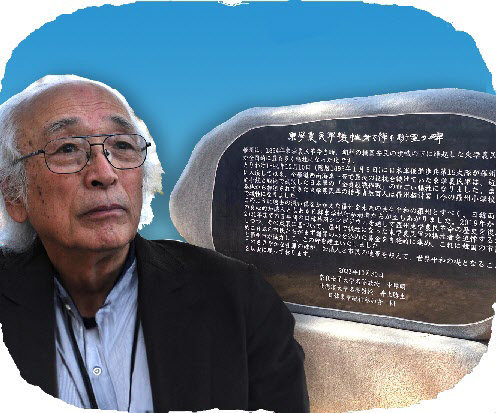Japanese people erect a monument of apology
Japanese people erect a monument of apology
Posted November. 08, 2023 08:03,
Updated November. 08, 2023 08:03

An unveiling ceremony was held at Naju Historical Park to display a monument of apology to honor victims of the Donghak Peasant Army, which was founded with funds raised by a Japanese. Katsuo Inoue, an emeritus professor at Hokkaido University, read the apology.
His interest in the Donghak Peasant Army began when he discovered the skull of a Donghak Army soldier in an anthropology class at the Department of Literature at Hokkaido University in 1995. The skull read “Head of Donghak leader in Korea” in calligraphy, was found abandoned, and then was “collected” from a mountain in Jindo, South Jeolla Province. Killing people and collecting their skulls for research – it could not be any more insulting. This was the way of imperialists. Killing people with guns and swords, with learning and depriving them of even the right to mourn.
It was a wake-up call for Professor Katsuo to search for information on the Donghak Peasant Army. He revealed massacres committed by the Japanese army at Honam Chotoyeong in Naju for 35 days from January 5 to February 8, 1895, by studying a war diary of a Japanese soldier. Armed with matchlocks and bamboo spears, the Donghak Peasant Army was no match for the Japanese soldiers with rifles. It was a crushing defeat, resulting in a massacre. Akira Nakatsuka, a professor emeritus at Nara Women's University who proposed the construction of an apology monument, referred to the Donghak Peasant Army massacre as "the first genocide committed by the Japanese military." So sorrowful is history that the story goes that whenever there is an event at Naju Elementary School, which was built on the site of Chotoyeong, it rains.
It was moving to see the Japanese people apologize. Why did they choose to apologize when doing so does not appear to serve their interests while their government denies what happened in the past? It is because “it is necessary to understand history based on facts to overcome problems from history,” per the quote of Professor Nakatsuka, who passed away one day before the ceremony. Above all, they should apologize because they are sorry for what they did. Perhaps the existence of such individuals explains why Japan is not as terrible as its wrongdoings in the past. They apologize, and we forgive again.






